Parent-led ABA is truly a game changer in child development! It empowers caregivers to take an active role in their child's therapeutic journey, which can lead to amazing improvements in communication skills, social interactions, and emotional management. Research shows that when parents engage in their child's treatment, they often see significant progress. This highlights just how crucial parental involvement is for achieving those positive developmental outcomes.
Imagine being part of your child's growth every step of the way! When parents participate, it not only strengthens the bond but also creates a supportive environment for learning. So, let’s explore this together! We’re here to help you every step of the way!
The journey of child development, especially for those with autism, can be profoundly influenced by the active participation of parents. By embracing parent-led ABA therapy, caregivers not only gain essential skills to support their children's growth but also create a nurturing environment that enhances communication, social interactions, and emotional regulation. Yet, many parents find themselves grappling with the complexities of balancing their involvement with daily life challenges.
So, how can they effectively integrate these strategies to maximize their child's potential and strengthen family dynamics? This article delves into seven transformative ways parent-led ABA can reshape child development. Let’s explore this together, offering insights and practical approaches for families to thrive together!
At Rori Behavioral Innovations Inc., we believe in the transformative power of parent led ABA support. By equipping caregivers with essential tools and knowledge, we empower them to take an active role in their child's development. This approach not only deepens parents' understanding of their child's unique needs but also equips them with effective strategies to implement at home. Research shows that when parents engage actively, treatment outcomes improve significantly, leading to better communication skills, social interactions, and emotional management in children with autism. For example, a meta-analysis revealed that parent-implemented interventions yield moderate to strong benefits, with effect sizes averaging around 0.55 across various outcomes for children, and specifically, an impressive 0.60 for enhancing social skills.
Creating a cooperative atmosphere is key, and at Rori Care, we ensure that treatment extends beyond clinical settings. We strive to establish a nurturing space that supports children's growth. Case studies indicate that children with involved caregivers tend to have better attendance, higher grades, and improved behavior and social skills. One study highlighted that kids whose parents actively participated in their treatment showed remarkable progress in communication and social abilities. Plus, caregivers trained in ABA techniques can effectively manage challenging behaviors, using strategies like positive reinforcement and structured routines to promote skill generalization in everyday life.
The importance of parent led ABA intervention is underscored by expert opinions, which highlight that caregivers serve as vital links between treatment and daily life. This active involvement not only strengthens the bond between parent and child but also enhances family dynamics, paving the way for lifelong success. However, we understand that parents face challenges, such as busy schedules and emotional stress, that can affect their involvement. At Rori Behavioral Innovations Inc., we are dedicated to empowering families, ensuring everyone has the chance to thrive through effective, personalized ABA therapy. Parents who engage in at least 40 hours of training can become trained behavior technicians for their children, further enhancing their ability to support their child's development. To fully reap the benefits of parent led ABA, we encourage parents to seek out training resources and actively participate in their child's therapeutic journey. Let’s explore this together!
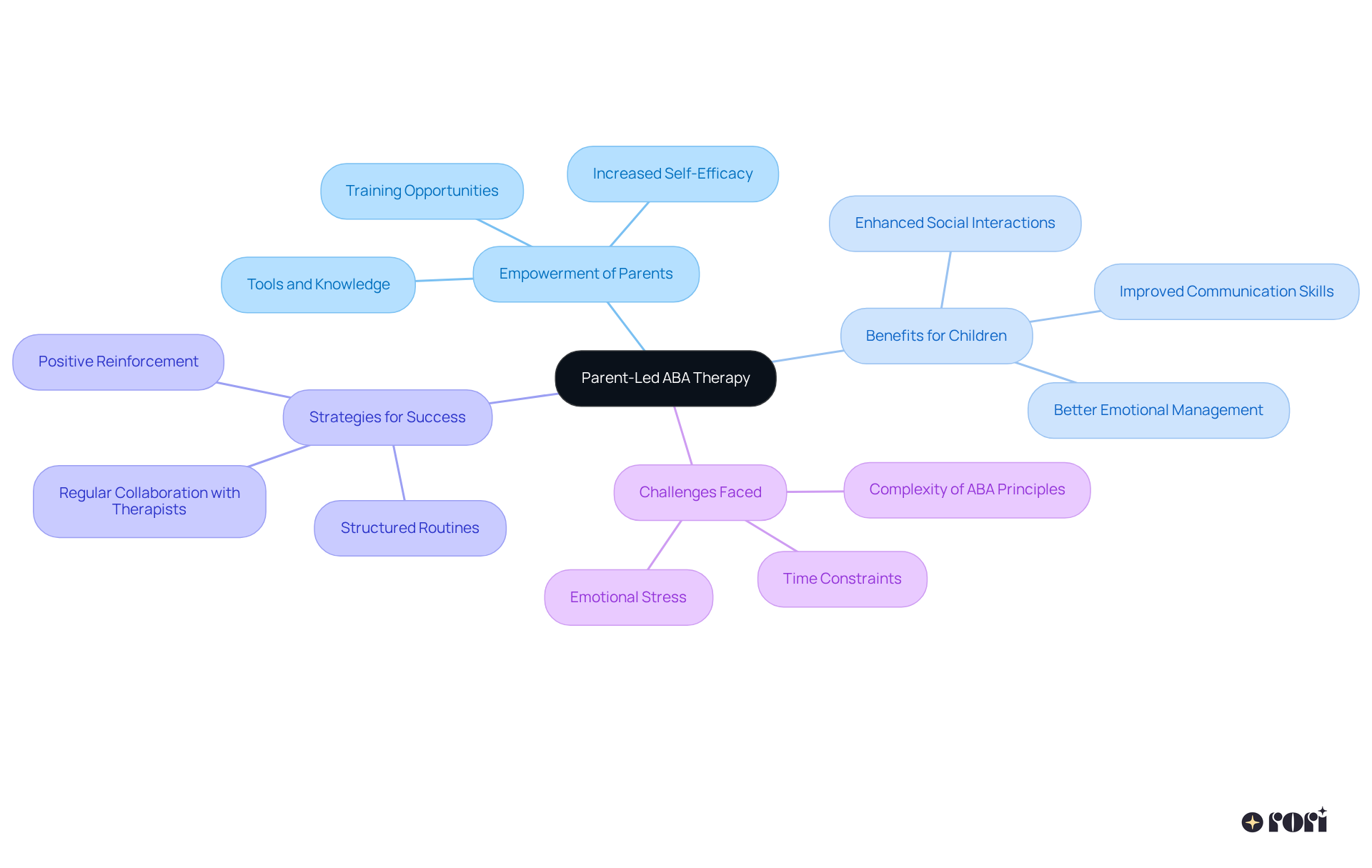
Did you know that kids with autism really thrive when their parents participate in parent led ABA intervention? When guardians take an active role in the learning process through parent led ABA, they help strengthen the skills taught during therapy sessions. This leads to faster and more effective skill development! Techniques like modeling behaviors, giving prompt feedback, and creating chances for practice in everyday situations make a huge difference in a child's educational experience.
Research shows that about 90% of individuals see significant improvement when caregivers are actively involved in parent led ABA and when the recommended treatment hours are fully utilized. This really highlights how important caregiver involvement is for achieving positive outcomes! Plus, training for caregivers in parent led ABA is crucial for effective treatment of children with autism spectrum disorder (ASD). It not only encourages a child's independence in self-care and social activities but also deepens the emotional bond between caregiver and child, creating a nurturing environment for ongoing growth.
By working closely with Board Certified Behavior Analysts (BCBAs), caregivers can ensure that therapeutic techniques are consistently applied in different settings. This helps kids generalize the skills they've learned in therapy to their everyday lives. So, let’s explore this together and see how we can support our children in their journey!
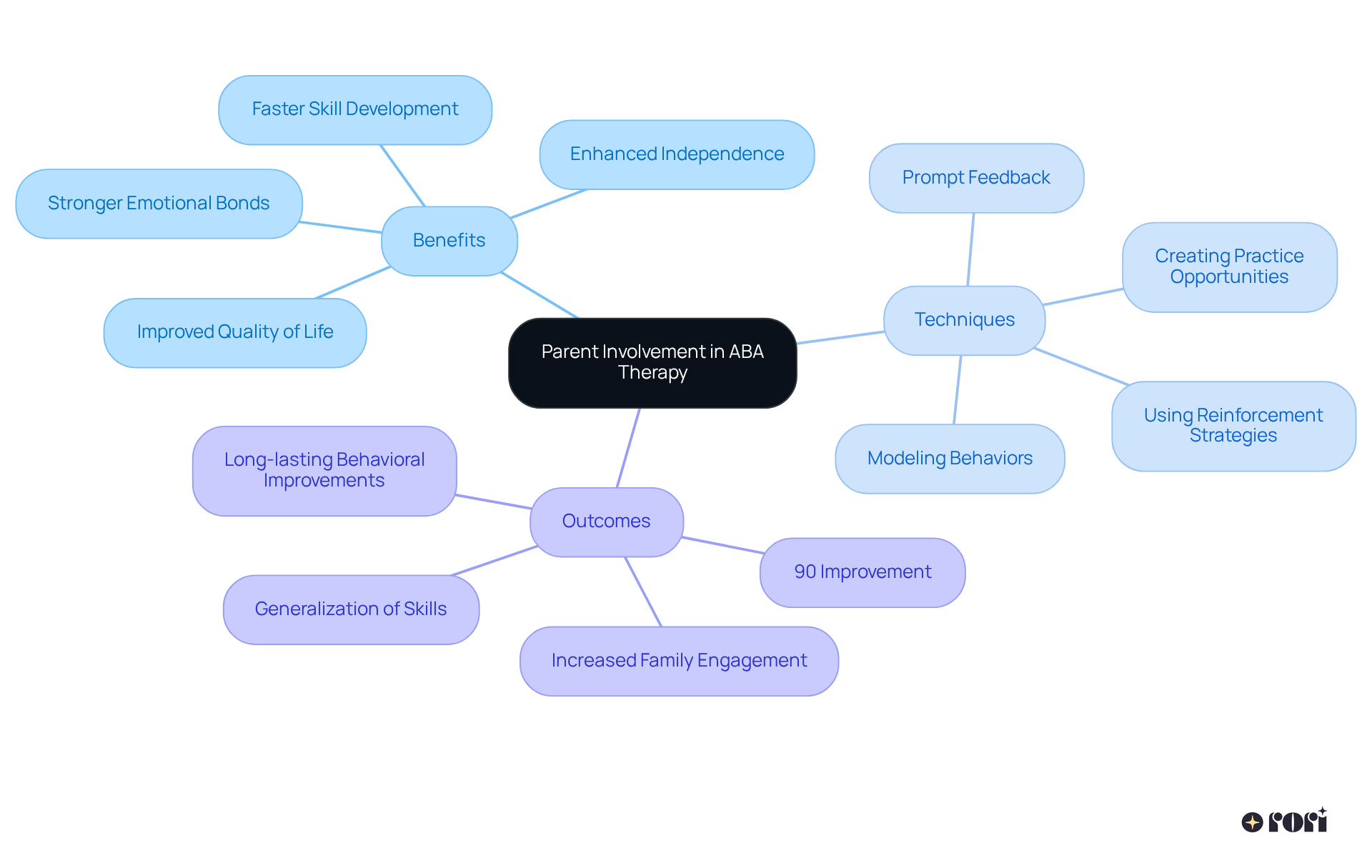
Strategies employing parent led ABA play a vital role in reducing challenging behaviors in individuals with autism. By consistently applying reinforcement techniques and behavior modification strategies at home, parents can utilize parent led ABA to create a structured environment that helps minimize disruptions. For instance, using positive reinforcement, setting clear expectations, and implementing consistent consequences can assist young individuals in understanding acceptable behaviors. Over time, this approach can lead to a noticeable reduction in challenging actions.
Let’s explore this together! Imagine a scenario where you set clear expectations for your child. When they follow through, a simple praise or reward can make all the difference. It’s about creating a supportive atmosphere that fosters growth and understanding. Remember, you’re not alone in this journey; many parents share similar experiences and challenges.
We’re here to help you every step of the way! By embracing parent led ABA methods, you can empower your child to grasp acceptable behaviors, paving the way for a more harmonious home environment. So, take a moment to reflect on how these strategies might fit into your daily routine. Every small step counts!

Skill generalization is all about applying what we've learned in different situations, and it’s a key part of effective ABA practice. Parents, your role in this journey is incredibly important, particularly in the context of parent led ABA! Your consistent reinforcement of skills at home, school, and in the community can make a huge difference in your child’s success. By creating opportunities for practice and encouraging the use of acquired skills in real life, you help bridge the gap from therapy to daily life, boosting your child’s independence.
Research shows that kids who get support from their guardians in various settings tend to have better skill generalization. For instance, when parents use handy tools like contingency maps and mini schedules, they can teach new skills more effectively while reducing escape behaviors. This approach not only fosters independence but also empowers young individuals to navigate different environments with confidence.
Experts agree that parent led ABA is crucial for reinforcing learned behaviors. Teachers who specialize in autism strategies have noted a 68% increase in confidence when they work alongside engaged parents, leading to improved outcomes for autistic students. Plus, communities with strong autism advocacy programs see 59% lower bullying rates, highlighting how supportive environments can enhance skill application.
It’s also important to recognize that 85% of college graduates with autism are unemployed, which underscores the long-term significance of skill generalization and independence for individuals on the spectrum. Case studies reveal that those who practice skills in diverse environments, with parental support, enjoy a 52% better quality of life. This emphasizes the vital role of skill generalization in parent led ABA therapy—not only does it improve behavioral outcomes, but it also fosters resilience and adaptability in youth. Families affected by autism report 79% higher levels of resilience compared to typical families, showcasing the strength and adaptability of families in supporting their children. By embracing your role as active change-makers, you can profoundly influence your child’s development and overall well-being. Let’s explore this together!
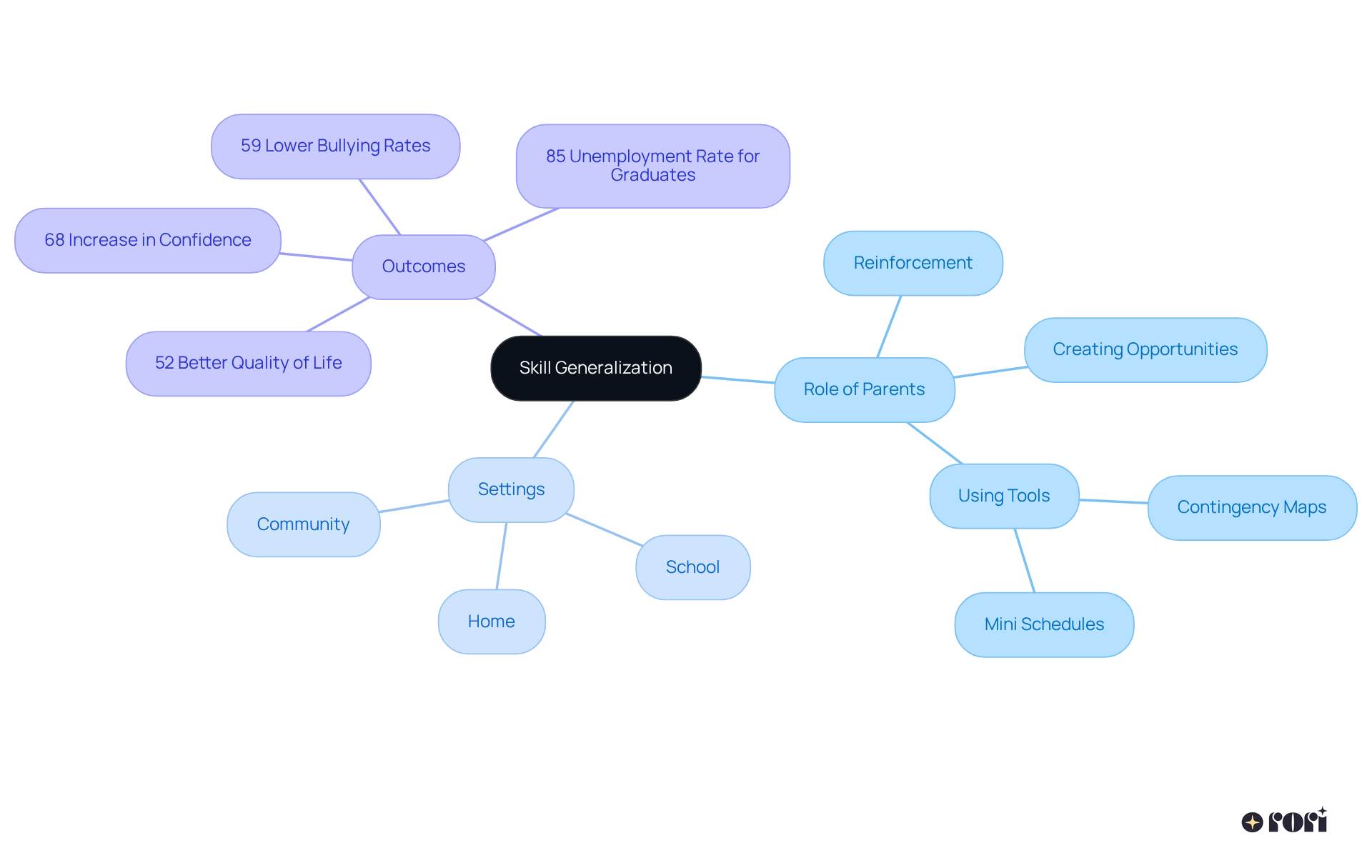
Active participation in parent led ABA support truly empowers caregivers, enhancing their confidence in meeting their children's needs. When caregivers see the positive impact of their efforts, it fuels their motivation to keep using parent led ABA strategies at home. This sense of empowerment in parent led ABA not only benefits the child but also fosters a feeling of accomplishment and resilience in caregivers, creating a lovely feedback loop that enhances the overall treatment experience.
Let’s explore this together! When caregivers feel capable and effective, they’re more likely to engage consistently in parent led ABA. It’s like a little victory every time they notice progress, and that’s something to celebrate! By sharing experiences and strategies, we can build a supportive community that thrives on shared successes and challenges. We’re here to help you every step of the way!
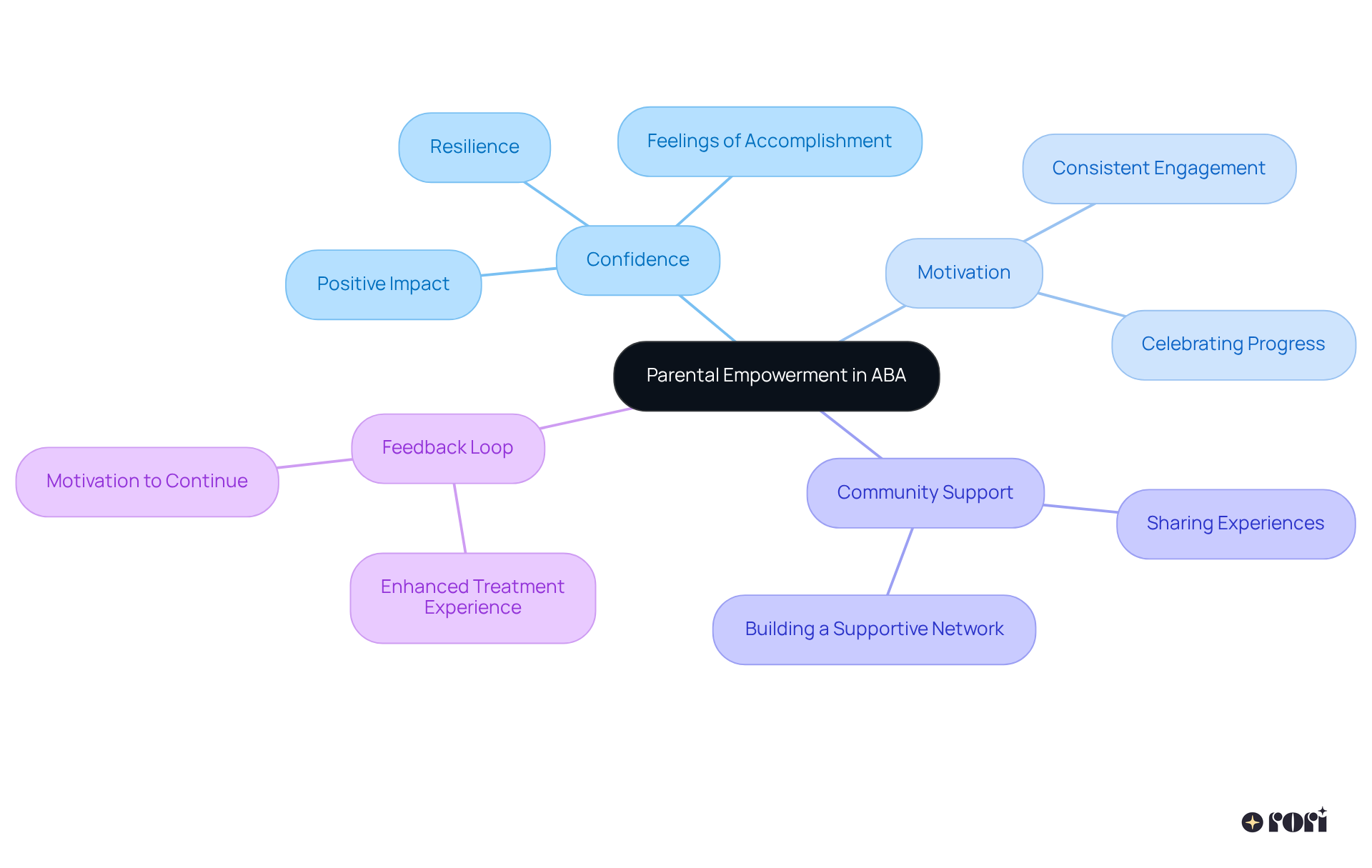
Cooperation between guardians and therapists is so important for making the most of ABA therapy! 🤝 When you keep the lines of communication open, share insights, and regularly review progress, it can lead to more tailored interventions that really meet the changing needs of your child. By working together in a parent led ABA framework, you and the therapists can create a united approach that not only enhances learning but also tackles challenges more effectively. This teamwork ultimately leads to better outcomes for your little one. Let’s explore this together!
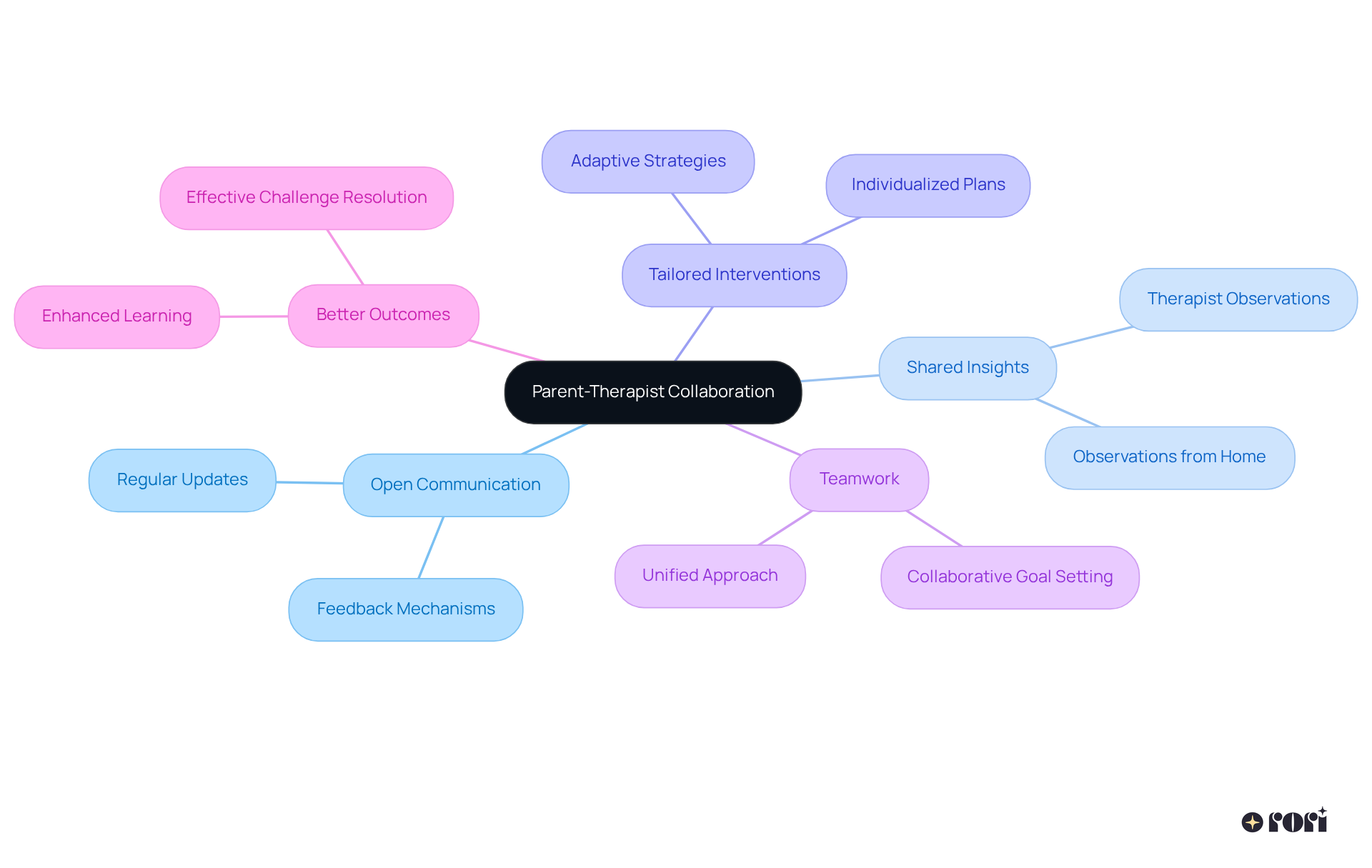
Parent led ABA practices offer not just immediate benefits, but they also play a crucial role in the long-term growth of individuals with autism. By consistently using ABA strategies, caregivers help their children develop essential life skills, improve social interactions, and enhance emotional regulation. For instance, a case study on parent-led interventions revealed that kids who received structured support from their parents made significant strides in communication and emotional regulation. This progress leads to greater independence and an improved quality of life as they grow up.
Interestingly, data shows that 90% of young individuals involved in intensive ABA therapy report noticeable improvements in adaptive behavior and cognitive functioning. This highlights just how important it is for parents to stay actively involved. This collaborative approach allows families to play a vital role in their child's developmental journey, creating a nurturing environment that encourages lifelong growth and success.
Plus, the effectiveness of parent led ABA treatment has proven to be a viable alternative to traditional ABA methods. It emphasizes the importance of personalized treatment plans tailored to each child's unique needs. So, let’s explore this together! We’re here to help you every step of the way!

Integrating ABA strategies into daily routines is so important for reinforcing learning and promoting skill generalization. Parents can easily create structured routines that include chances for practice—like using mealtime to teach social skills or playtime to boost communication. For instance, during meals, kids can practice asking for food items and taking turns through mand training. This not only encourages social skills but also strengthens positive behavior. Research shows that having a structured daily routine in ABA treatment can help lower anxiety and boost engagement, making learning more effective.
There are some great examples of embedding ABA in everyday activities, such as using visual schedules during morning preparations. These schedules clarify expectations and promote independence. By consistently applying parent led ABA principles in familiar settings, parents can ensure their children receive ongoing reinforcement, leading to better outcomes and a more natural learning environment. Experts emphasize that the key to successful parent led ABA intervention is incorporating these strategies into daily life, which allows kids to use the skills they learn in sessions in real-world situations. As families embrace these strategies, they not only enhance learning and preferred behaviors but also make significant improvements in their children’s quality of life. Let’s explore this together!

Practices involving parent led ABA can really boost family dynamics! They help foster communication, collaboration, and mutual understanding among family members. When caregivers actively engage in their child's treatment using parent led ABA, they gain a better insight into each other's roles and contributions. This cooperative approach not only strengthens the bond between parents and children but also fosters parent led ABA, creating a supportive family atmosphere where everyone feels valued and involved in the child's growth.
Research shows that effective family engagement in parent led ABA leads to noticeable improvements in communication skills among relatives. This highlights the idea that treatment isn't just about the child; it’s also about enhancing family connections. Experts emphasize the importance of this collaborative treatment model, noting that parent led ABA can transform family dynamics by encouraging shared goals and joint problem-solving. This, in turn, leads to a more unified and resilient family unit.
Additionally, guardians typically undergo more than 40 hours of training in ABA methods before providing treatment. This training is essential, especially given that the prevalence rate of autism spectrum disorder (ASD) is currently one in 36. It underscores the need for effective support options for families. As Lindsey Sneed points out, 'Interventions rooted in applied behavior analysis (ABA) are prevalent for individuals with ASD, showing significant enhancements in communication, social, and adaptive functioning.' By participating in their child's treatment sessions, parents can reinforce these advancements and cultivate a more connected family atmosphere. Let’s explore this together and see how we can support each other on this journey!
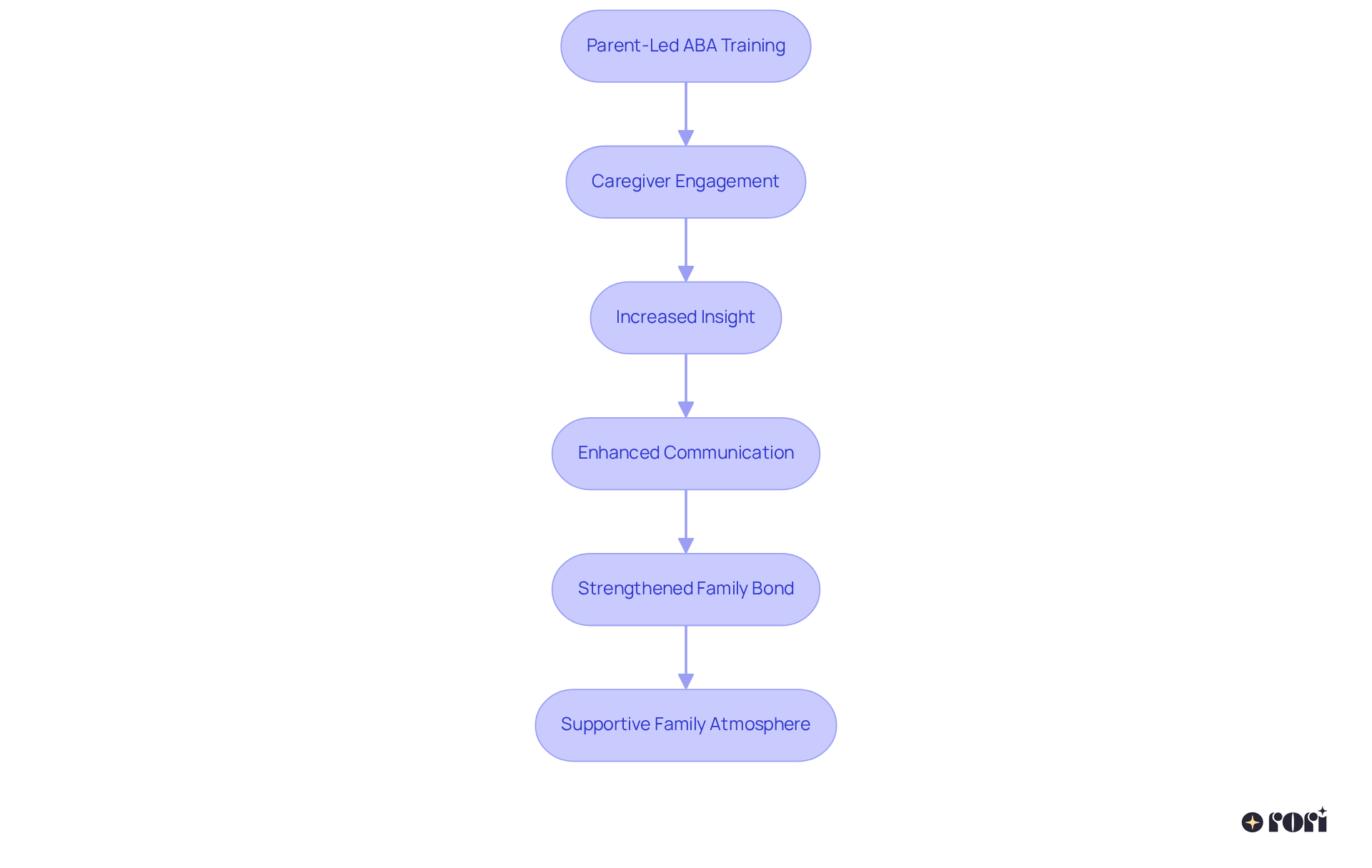
Community engagement is absolutely vital for the success of parent led ABA programs. By connecting with local support groups, online forums, and community resources, caregivers can share their experiences, gain valuable insights, and access tools that enhance their child's treatment. These networks not only provide emotional support but also practical advice, empowering parents to navigate the complexities of raising a child with autism effectively.
Interestingly, studies reveal that communities with strong autism advocacy initiatives report 59% lower bullying rates. This positive shift significantly enhances the overall atmosphere for youth receiving treatment. Plus, classrooms that embrace universal design for learning principles see 57% better outcomes for autistic students. This really highlights the importance of inclusive environments that bolster parent-led initiatives.
Participating in support networks can greatly enhance the effectiveness of parent led ABA interventions, which leads to improved behavioral outcomes and social skills growth for children. Expert insights show that teachers with autism-specific training report 68% higher confidence in supporting autistic students. This underscores how valuable informed community members are in creating an inclusive atmosphere.
By tapping into local resources and building strong support networks, parents can cultivate a nurturing environment that reinforces the strategies learned in therapy. This approach can truly transform their child's development. As Kerry Magro beautifully states, 'The fight against autism stigma has to be fought by all of us—from those on the spectrum to those who love someone with autism to those who work with people with autism.' Let’s explore this journey together!
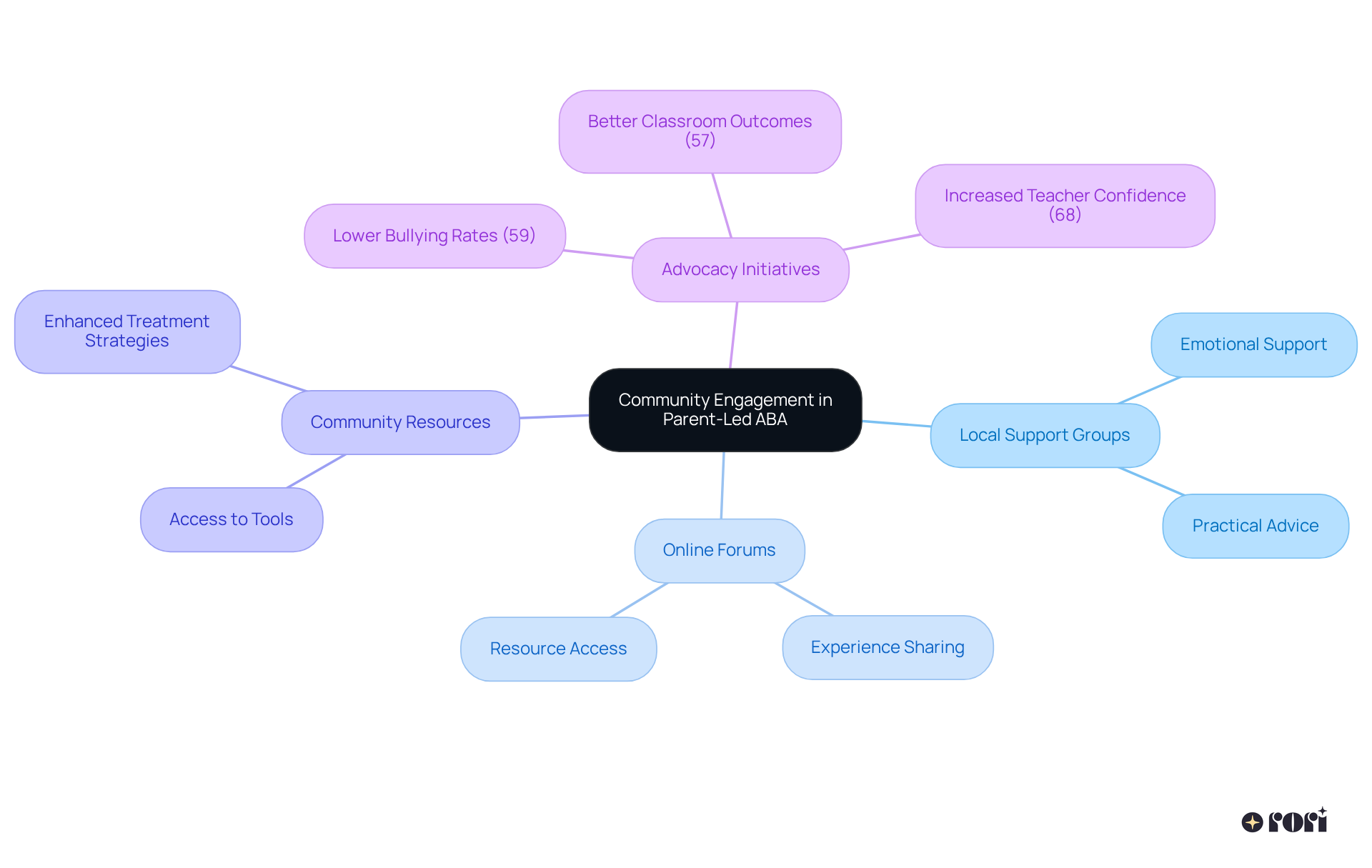
The transformative potential of parent-led ABA therapy is truly remarkable! It significantly enhances child development by empowering caregivers to take an active role in their child's therapeutic journey. This approach not only fosters better communication and social skills but also strengthens family dynamics. When parents actively engage, treatment outcomes improve, as research shows the positive effects of consistent involvement in ABA strategies.
Throughout this article, we've explored key insights, like the importance of skill generalization and effective behavior management. Parents who weave ABA techniques into daily routines create a nurturing environment that promotes their child's independence and resilience. Plus, when parents collaborate with therapists, interventions can be tailored to meet each child's unique needs effectively.
Ultimately, embracing parent-led ABA is about more than just immediate results; it lays the groundwork for lifelong success. By fostering a supportive community and leveraging available resources, families can navigate the complexities of autism treatment together. This journey highlights the significance of active parental involvement, enhancing not only the child's development but also enriching family relationships, creating a more harmonious and understanding environment.
Engaging with local support networks can further amplify these benefits. So, let’s seek out connections that empower us and our children in this shared endeavor! Remember, we’re here to help you every step of the way!
What is the focus of Rori Care's ABA therapy approach?
Rori Care focuses on parent-led ABA therapy, empowering caregivers with essential tools and knowledge to actively participate in their child's development, which enhances treatment outcomes.
How does parent involvement impact children with autism in ABA therapy?
Active participation of parents in ABA therapy leads to significant improvements in communication skills, social interactions, and emotional management for children with autism.
What evidence supports the effectiveness of parent-implemented interventions?
Research, including a meta-analysis, shows that parent-implemented interventions yield moderate to strong benefits, with effect sizes averaging around 0.55 for various outcomes and 0.60 specifically for enhancing social skills.
What role do parents play in creating a supportive environment for their child's development?
Parents create a cooperative atmosphere that extends treatment beyond clinical settings, leading to better attendance, higher grades, and improved behavior and social skills in children.
What challenges do parents face in being involved in their child's ABA therapy?
Parents may encounter challenges such as busy schedules and emotional stress, which can affect their ability to participate actively in their child's therapy.
How can parents enhance their ability to support their child's development through ABA therapy?
Parents can engage in at least 40 hours of training to become trained behavior technicians, which further enhances their ability to support their child's development.
What are some techniques that parents can use to improve skill acquisition in their children?
Techniques include modeling behaviors, providing prompt feedback, and creating opportunities for practice in everyday situations, all of which contribute to faster and more effective skill development.
How does parent involvement affect the generalization of skills learned in therapy?
By working closely with Board Certified Behavior Analysts (BCBAs), caregivers can ensure that therapeutic techniques are consistently applied across different settings, helping children generalize learned skills to everyday life.
What strategies can parents use to manage challenging behaviors at home?
Parents can use positive reinforcement, set clear expectations, and implement consistent consequences to help children understand acceptable behaviors and reduce challenging actions over time.
How can parents create a supportive atmosphere for their child's growth?
By setting clear expectations and providing praise or rewards for following through, parents can foster a supportive environment that encourages understanding and growth.